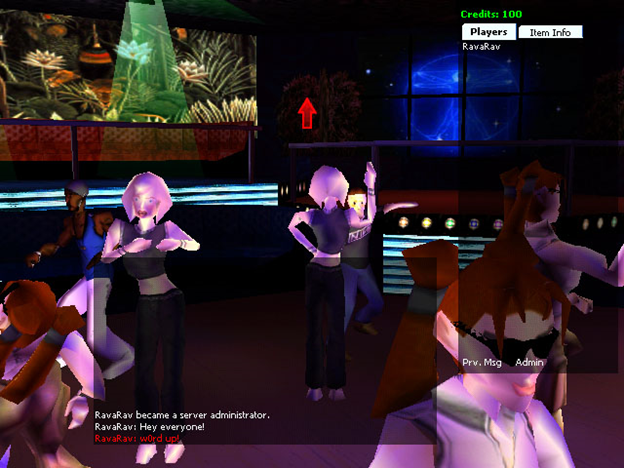Today, virtual online communities or massively multiplayer online games like Club Penguin or World of Warcraft are taken for granted. Although the first crude MMOs started cropping up in the 1980s, it wasn't until the creation of Second Life in 2003 that the concept of hanging out with your friends and total strangers in a virtual world (rather than just a chatroom) really entered the popular imagination.Indeed, it was this explosion of interest in Second Life and chat technologies like IRC and AIM that led Martin C. Martin, now a software engineer at Facebook, to develop Esc, the virtual nightclub that never was." Esc was compared to Second Life a lot, but it wasn't owned by a company," Martin told me over the phone. "That was something that was important to me because I really like the mod community and allowing people to take something and run with it. I wanted a more freeform experience where people could set up their own servers and experiment with their own rules."Although there was an obscure 1997 point and click PC game called Virtual Nightclub, Esc was the first 3D virtual nightclub that functioned as an MMO. Described as " Dance Dance Revolution meets Tony Hawk," the platform allowed users to design their own nightclubs and bars, create their own virtual DJs, bust a move on the dance floor, take some "magic pills," or just find a place in the club for a private conversation with some friends. Esc was created by modifying Unreal Tournament, a popular first person shooter game, while Martin was at Carnegie Mellon studying robotics in 2004. In its final iteration, Esc was an eclectic mix of open-ended and pre-programmed design. It made use of rudimentary AI to create believable 3D chatbots in the club and users could program their own dance moves. It also was a basic experiment in signal processing insofar as users could upload their own MP3 files and extract beats for use in their clubs.As Martin described it to me, Esc was a platform before the idea of 'platforms' had really taken off with the rise of social media like Facebook and Twitter. Ultimately, however, Esc never existed beyond Martin's local servers, where the game was accessed by himself and his friends." Esc was used twice for two online parties, but it never really launched," said Martin, who described the project as being much larger than he anticipated. "I put a lot of time and effort into it, but it was only ever functional for a couple of hours on two occasions"Although Esc never took off, there's no question it was ahead of its time. Today, players can hang out in virtual nightclubs like Afterlife in Mass Effect 2, Malibu Club in Grand Theft Auto, or the dozens of nightclubs that populate Second Life. Within the last few years, a number of standalone virtual nightclubs have popped up as well, such as Club Rothko or Club 53. With the slow rise of VR, virtual strip clubs and nightclubs are becoming more realistic than ever.But for anyone who still has a copy of Unreal Tournament 2004 lying around and wants to keep it old school, there is a patch for Esc that can be downloaded from Martin's website.
Esc was created by modifying Unreal Tournament, a popular first person shooter game, while Martin was at Carnegie Mellon studying robotics in 2004. In its final iteration, Esc was an eclectic mix of open-ended and pre-programmed design. It made use of rudimentary AI to create believable 3D chatbots in the club and users could program their own dance moves. It also was a basic experiment in signal processing insofar as users could upload their own MP3 files and extract beats for use in their clubs.As Martin described it to me, Esc was a platform before the idea of 'platforms' had really taken off with the rise of social media like Facebook and Twitter. Ultimately, however, Esc never existed beyond Martin's local servers, where the game was accessed by himself and his friends." Esc was used twice for two online parties, but it never really launched," said Martin, who described the project as being much larger than he anticipated. "I put a lot of time and effort into it, but it was only ever functional for a couple of hours on two occasions"Although Esc never took off, there's no question it was ahead of its time. Today, players can hang out in virtual nightclubs like Afterlife in Mass Effect 2, Malibu Club in Grand Theft Auto, or the dozens of nightclubs that populate Second Life. Within the last few years, a number of standalone virtual nightclubs have popped up as well, such as Club Rothko or Club 53. With the slow rise of VR, virtual strip clubs and nightclubs are becoming more realistic than ever.But for anyone who still has a copy of Unreal Tournament 2004 lying around and wants to keep it old school, there is a patch for Esc that can be downloaded from Martin's website.
Advertisement

